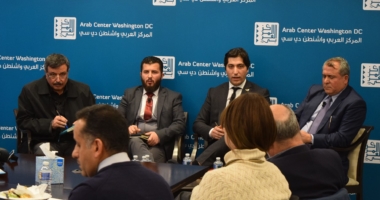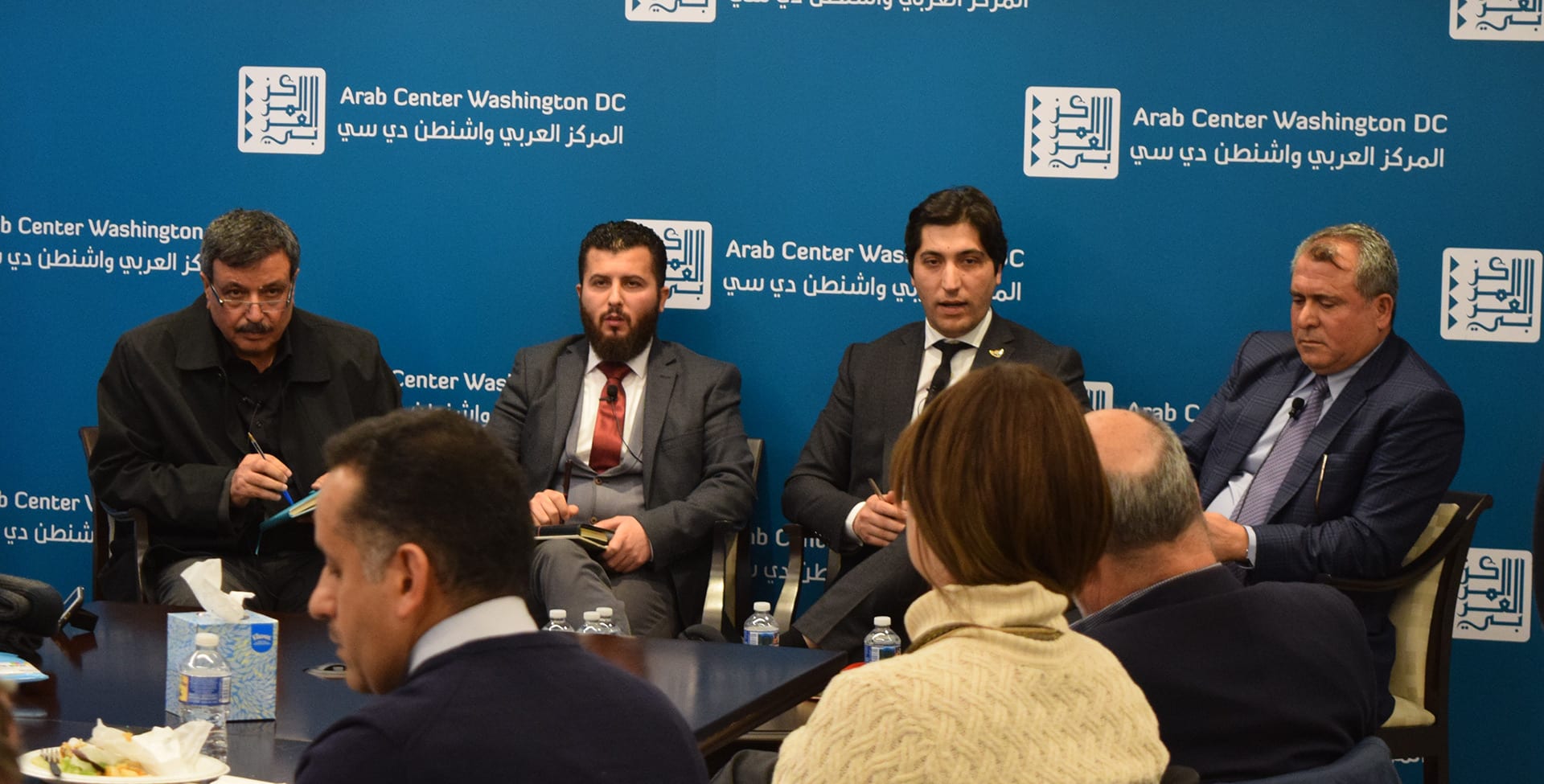

Event Summary
On January 17, 2018, Arab Center Washington DC (ACW) hosted an event titled “Updates from Syrian Opposition Figures.” Five leaders from the Syrian opposition to President Bashar al-Assad’s regime were on an unofficial visit to the United States organized by the Syrian American Council, where they met with representatives from the US Congress, Department of State, and Department of Defense.
The guests were Osama Abu Zeid, principal spokesman of the Syrian opposition at the Astana diplomatic talks; Yasir Al Haji, head of the Foreign Relations office of the Syrian Interim Government; Khalid Aba, political chief of al-Jabha al-Shamiya (Levant Front); Mustafa Sejari, founder of the Mutasem Brigade; and Saad Fahd al-Shweish, former head of the Raqqah Provincial Council and the local council in Tel Abyad. Abu Zeid and Al Haji represented the group’s views in this session.
Abu Zeid explained that Russia’s intervention in Syria, starting in 2015, targeted the FSA in cities such as Hama and Aleppo and in eastern Ghouta close to Damascus; therefore, the FSA’s mammoth challenge was to face Russian air power and Iranian ground troops. He said that the opposition’s loss of Aleppo prompted a major shift in the Syrian revolution, which led to the talks in Astana, Kazakhstan; however, the opposition did not want to negotiate with Russians and Iranians as they are the main backers of the Syrian regime.
As for strategic border areas, Abu Zeid said that FSA brigades had liberated Syria’s al-Badia desert region from IS; this is territory close to Iraq’s border, where Iranian fighters enter Syria. Later, Pentagon and CIA officials asked these brigades to withdraw, compromising the opposition’s hard-won gains. Abu Zeid explained that the long Syrian-Turkish border, in addition to the three million Syrian refugees there, make it important for Syrians to have good relations with Turkey. As Turkey faces its own challenges with Kurdish nationalism, he said Ankara’s main goal in Syria is to keep the Democratic Union Party (PYD, a Kurdish nationalist group linked to the Kurdistan Workers’ Party, or PKK) away from its borders. For the Syrians, Abu Zeid continued, it becomes sensitive to cooperate with the Syrian Kurds because they oppose the Turkish regime. The Syrian opposition would like to solve its problems with the Syrian Democratic Forces (SDF, a predominantly Kurdish group in Syria) once the SDF makes clear its stance on the Assad regime.
Al Haji added that it is important to differentiate between the SDF and the Syrian citizens who are Kurdish. The SDF, he said, is not honoring human rights protections and has not put forth a clear vision for Syria’s future, especially regarding dividing the country—an idea the opposition strongly resists.
Abu Zeid contended that because of the Kurdistan issue, Iran and Turkey became closer, and now Turkey and Russia are working hard to include Iranians in Syrian de-escalation zones. The Syrian opposition, he said, perceives this as dangerous because Iran-supported forces would simply exchange their militia uniforms for UN uniforms—and their designs for Syria would remain the same. At present, he said, a number of Syrian cities are occupied by Hezbollah or Iranian, Afghan, and Iraqi militias, many of whose members are being granted Syrian passports and citizenship—a development that will have serious implications for future elections and negotiations.
Both Abu Zeid and Al Haji emphasized the opposition’s goals of democracy and human rights in Syria. They indicated serious mistrust of Russia’s intentions in the country. They asserted, “We believe that the Russians never do as they promise” and “unfortunately, our allies never listen to our advice” regarding the Russians—who, they said, lie about developments, never release prisoners, and do not allow humanitarian convoys to enter besieged areas.
The speakers pointed out that the main focus of the Russians in the Geneva process is the constitution and elections. This is problematic because it ignores the principal issue in Syria, which is the political transition. As for the United States, they said there is no American interest in discussing Syria meaningfully, which will lead to future problems such as a growing Iranian-supported militia presence in Syria—which they characterized as becoming a “Syrian version of Hezbollah.” They added that Iran already controls large areas and major highways in the country, so confronting Iran in Syria will be a big undertaking, one that requires Arabs and Sunnis to work together. The security situation in Syria is a huge problem that needs to be addressed, the speakers added.
The Syrian opposition figures forecast many changes in the near future regarding how the US administration deals with Syria. They also described their meetings with American officials as positive and productive, indicating a change for the better in US policy toward Syria.
Event Photos
